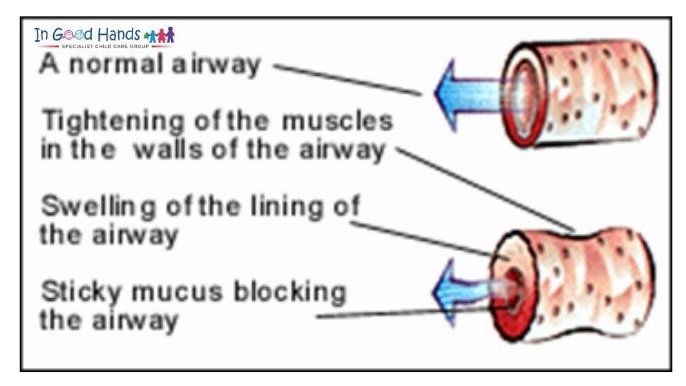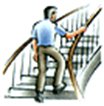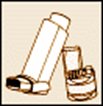Attack Asthma
You are not alone
If you suffer from asthma, or someone dear to you does, you need to learn more about it.
Like you, many people suffer from asthma. But, with advice from your doctor, you can lead a full, normal and active life.
Over the last 20 years, important advances have been made in understanding asthma. New therapies have been developed that can help you enjoy life to the full. Therapies those are simple, effective, and safe – to a degree never possible before. Parents of children who suffer from asthma will be especially happy to know that their children can enjoy largely symptom-free life, alongside normal children.
This topic tries to cover most aspects of asthma, including the various triggers that might cause the symptoms. It looks at the modern asthma treatments available, as well as the importance of preventive care.
It aims to give you the essential facts on asthma and its treatment. Above all, to advise you, that with guidance from your doctor, you can lead a happy and more fulfilling life.

This thing called asthma
Asthma is a condition that affects the lungs. People with asthma usually have difficulty in breathing, and often cough a lot. This is because the airways – the pipes that take air to your lungs when you breathe – become narrower than usual. This may be caused by the tightening of the muscles in the walls of the airways, a swelling in the linings of the airways and by sticky mucus blocking them up. This makes it harder for the air to go in and out of your lungs, so you have difficulty in breathing.


Asthma is common. It can start any age. Men and women, young and old, people of all races and nationalities can develop asthma. Asthma tends to run in families, but sometimes it skips several generations, so not everyone in the family is affected. About half of all children who have asthma grow out of it.
The good news for everyone with asthma is that it can be treated. In fact, it can be treated so well that you can lead a completely normal life. It is important to realize that with regular medication, asthmatics can enjoy a life that is as fulfilling and active as anyone else.
Symptoms to look out for
The main symptoms

The main symptoms of asthma are cough, wheezing, tightness in the chest and shortness of breath. Wheezing - a whistling sound when you breathe - is easy to recognize, and everybody associates it with asthma. Breathlessness and tightness in the chest are also quite obvious and well recognized as asthma symptoms.
Other Symptoms

Disturbed sleep - Asthma symptoms are variable and tend to be worse at night or in the early hours of the morning. If coughing at night wakes you up, asthma is one of the most likely causes.

Breathlessness when exercising - When people with asthma exercise, they may cough or wheeze and get more breathless than other people. They also become more breathless after they have stopped exercising. This is typical of asthma.

Cough and Cold - Everybody gets a cold. But an asthma patient keeps coughing and feeling breathless even after the cold has cleared up. Many people automatically think, 'cough, therefore chest infection'. This is not true. In fact, asthma is one of the most common causes of a recurrent cough.
These symptoms vary from person to person and from time to time in the same person. Some people have all the symptoms, while others may have only a cough or wheezing.
Some things that could start asthma attack

Colds and viruses are triggers for 8 out of 10 people with asthma.

Cigarette smoke and smoky places are triggers for 7 out of 10 people with asthma.

Cold air is a trigger for 6 out of 10 people with asthma.

House-dust is a trigger for 7 out of 10 people with asthma.

Air pollution is a trigger for 4 out of 10 people with asthma.

Physical exertion and exercise is a trigger for 8 out of 10 people with asthma.

Pollen is a trigger for 5 out of 10 people with asthma.

Fur or feathers from pets are triggers for 8 out of 10 people with asthma.
There are number of other substances, like insecticides, paint fumes, grain, flour dust and wood dusts, which are known to trigger asthma attacks. Even a change in the weather can trigger an attack. Emotional upset can also act as a trigger.
Understanding your treatment
There is no single treatment for every case of asthma. Different people may need different medicines. Your doctor will prescribe the right medicine, or combination of medicines, and show you how to use them properly. Asthma medicines can help you lead a normal and active life.
With regular, long-term treatment you can aim to achieve the following
- A complete absence of asthma symptoms, or only minor symptoms during the day.
- Peaceful sleep at night, without any symptoms.
- No need to miss work, studies or other activities because of asthma.
- No emergency visits or stays in a hospital.
- Full participation in physical activities.
- Extremely few, if any, side effects from your asthma medicines.
Asthma medication - two types
- ‘Quick-relief’ medicines – Relievers
Relievers give instant relief, but only act for a maximum of 4-6 hours. Relievers help to relieve cough and breathing difficulties when an attack sets in. Whenever you feel breathless, take the medicine your doctor has given you for relief. This should immediately widen your airways and make breathing easier. - ‘Preventive’ medicines – controllers
controllers do not give immediate relief. However, when used over prolonged periods of time, they control asthma better and prevent further attacks.
Controllers help protect the airways. They make asthma attacks less likely. They will not help relieve an asthma attack. But regular use of your controller is the key to keep your asthma in check, thereby reducing the need for Reliever medicines.
Ways of taking asthma medicine
There are different ways of taking asthma medicines. Some are to be breathed in (inhaled). Others are to be swallowed (oral). And some others are to be injected.
- Inhaled medicines are not more commonly used.These medicines are breathed directly into the lungs, where they are really needed.The devices used to deliver the medicine to the lungs are called inhalers.Inhalers also reduce the chance of side effects, as very little medicine is allowed to reach any other part of the body.
- Oral medicines include tablets and syrups.Unlike inhaled medicine,oral medicines take longer to act,as they pass from the stomach to the bloodstream and finally to the lungs, where they are needed.
Different ways of administering asthma medicines.

Inhalers

Tablets

Syrup

Nebulisers

Injections
Inhalation Therapy - some facts
- The most effective treatment
- The method most practiced to keep asthma in check, around the world, is the use of modern, pocket-sized inhalers. As inhalers help the medicine reach your lungs directly, they work faster.
- Contrary to popular belief, inhaled medicines are not the last resort for asthma patients. Even for the mildest cases, inhaled medicine is the first line of defense. The earlier you start your inhalation therapy, the better.
- Both Reliever and controller medicines can be administered through inhalers.
- The safest treatment
- Inhalers give you quick relief, using the minimum amount of medicine. In fact, with inhalation therapy, you need only one-tenth, or even less, of the medication. With very little medicine reaching the other parts of your body, inhalation therapy is much safer.
- The cost-effective treatment
Besides being more effective, inhalation therapy works out to be less expensive than using oral medication regularly.
In addition, with regular inhalation therapy, your chance of missing work or school is reduced, resulting in substantial savings.
Signs that your asthma is getting worse
If you notice any of the signs listed below, consult your doctor. They suggest that your treatment may need to be adjusted.
- The wheezing and shortness of breath are more troublesome and frequent.
- You often wake up at night due to breathlessness of coughing.
- Even walking a short distance leads to difficulty in breathing.
- You need to take your Reliever medicine more frequently.
- You fail to respond to your usual medication.
Some things to remember in case of an attack
- Stay calm. Do not panic.
- Do not ignore the problem.
- Take the medicine you have been prescribed for such a situation.
- If the medicine does not have the desired effect,call your doctor.
Frequently Asked Questions
You can lead a normal and active life, even if your have asthma. All you have to do is follow your doctor’s instructions and take your medicines regularly.
In general, you need controller medicine for asthma when:
- There is cough, breathlessness or wheezing during routine activities, more than two or three times a week.
- Your sleep is disturbed by cough or wheezing every week.
- You need to use Reliever medicine daily, or even three to four times a week.
However, in this regard your doctor is the best judge.
Yes. Preventive medicines, in the inhaled form, can be safely used for many years. In fact, it is important to use them without fail and as instructed by your doctor.
Inhaled asthma medicine used in the correct way, as recommended by your doctors, usually has no serious side effects.
No. Using asthma medicines regularly does not make you dependent on them. Never cut down or exceed the dose prescribed by your doctor. There is no way you can get addicted to them.
Yes. You should continue to take your medicines as directed by your doctor. Just as some people need glasses to see clearly, asthma patients need continuous preventive treatment to breathe properly.
Yes, but if exercise makes you feel breathless, consult your doctor. He will prescribe appropriate medicines. Swimming and yoga seem to be helpful for people with asthma.
There is no definite answer to this question, because very little is known about the influence of diet on asthma. If you notice that eating a certain type of food brings on an attack, avoid it completely.
If you have asthma, it is extremely important that you don’t smoke. Cigarette smoke makes your asthma worse by irritating your airways and causing them to narrow. It is just as important to avoid passive smoking, i.e. smoke from other people’s cigarettes.
Quite simply, the way you feel is the best indicator of your condition. Also, maintaining a daily health record and following up regularly with your doctor like Dr.Vivek Goswami, may help you monitor your condition better. Sometimes, a doctor may prescribe a Peak flow Meter for you to monitor your asthma at home. You can ask your doctor about a Peak flow Meter.
It is extremely important to control asthma during pregnancy, as uncontrolled asthma is a risk to the health of both the mother and the unborn child. Taking asthma medicine through inhalation during pregnancy and while breast-feeding does not pose a problem. However, you must consult your doctor.
Not really. You can travel by any mode of transport as long as your asthma is under control. However, always remember to carry your medicines with you.
Though the tendency to have asthma runs in families, this does not mean that if you have asthma, your children will necessarily get it.
Myths about asthma | Reality |
Asthma cannot be controlled | Asthma cannot be cured, but it can be easily controlled |
Asthma is contagious. | Asthma is not an infectious or contagious disease. |
Asthma medicines are addictive. | No, they are not. Never cut down (or exceed) the dose prescribed by your doctor. |
Inhalers for asthma are strong and used as a last resort. | As inhalers use small amounts of medicines, they are the first and safest line of defense against asthma. |
Your child and asthma
As the parent of a child who suffers from asthma, you will be happy to know that asthma need not restrict your child from leading a normal, active and largely symptom-free life.
There may be times when your child gets frustrated or depressed. Only your positive attitude can help him overcome these feelings. Remember, with regular medication and your doctor’s guidance, your child can lead a happy and more fulfilling life.
Help your child fight asthma
- Always encourage your child to take part in normal, day-to-day activities.
- To boost your child’s self-confidence, encourage him to do the things he enjoys most.
- Encourage your child to be as independent as possible.
- As your child grows older, teach him about asthma.
- Teach your child to be totally responsible for taking medicines regularly.
- Your child should know whom to call in case of an emergency.
- Make sure you inform the school authorities about your child’s asthma.
Answers to questions parents often ask
Some children outgrow their asthma as they approach their teens or even earlier. In others attacks could persist, or stop for a few years and then start again.
Asthma is not contagious. Someone who has it cannot pass it on to others. Though the tendency to have asthma runs in families, this does not mean that if one of your children has asthma, the others will necessarily get it.
It is important for children with asthma to take part in exercise programs that increase their physical tolerance without aggravating asthma. If it interferes with their breathing, inform your doctor. He can prescribe appropriate medicines. Swimming and yoga are excellent for children with asthma. Breathing exercises may also be helpful.
Excitement, anger and frustration can aggravate an attack in an asthmatic child. Family problems may also make his condition worse. A positive and confident attitude in parents can go a long way in helping a child with asthma.
Very little is known about the influence of diet on asthma. If you notice that a certain type of food makes your child’s asthma worse, avoid it completely. In infants, breast-feeding helps to build up immunity to diseases.
It is important not to hide your child’s asthma from the teacher. Discuss the symptoms and treatment with the teacher. Make sure your child carries the necessary medicine to school.
Yes, as long as the asthma is under control. Your child must carry the prescribed medicine, including medicine for a severe attack. It is also very important to remind the accompanying teacher about your child’s asthma.
Famous sportsperson who have not let asthma stop them:
- Cricketer Ian Botham
- Athlete Jackie Joyner Kersee, Olympic Gold Medallist.
- Swimmer Mark Spitz, winner of nine Olympic Gold Medals.
Inhalation devices you can use
|
Powder Inhaler |
Spray Inhaler |
|
Spacer |
Nebuliser Nebulisers are used for giving higher doses of medication at times when breathing becomes very difficult. They are machines that transform the medicine into a fine mist, which can be breathed in by normal breathing, via a facemask or a mouthpiece. Nebulisers are usually used in hospitals and nursing homes, for the management of severe attacks. |
Following your doctor’s instructions and the proper usage of your inhalation devices is essential to keep your asthma under control. The following pages give you some guidelines on the effective use of different types of inhalation devices.
How to use your Rotahaler
|
1. Insert the transparent end of the Rotacap into the raised square hole of the Rotahaler. |
2. Hold the top of the Rotahaler firmly with one hand. Rotate the base until the capsule breaks. |
|
3. Breathe out through your mouth. Then, placing the Rotahaler between your lips (as shown), breathe in through your mouth as deeply as possible. |
4. Remove the Rotahaler from your mouth. Hold your breathe for 10 seconds or as long as you find comfortable. Breathe out. |
For step-by-step details on how to use this device, please follow your doctor’s instructions and refer to the leaflet in the product pack.
How to use your Spacer
|
1. Assemble the Spacer by pushing the notch of one half into the slot of the other half. |
2. After shaking the inhaler well, fit it into the Spacer. |
|
3. Breathe out through your mouth. Then close your lips around the Spacer, as shown. |
4. Press the top end of the inhaler. Then, breathe in deeply through your mouth. |
|
5. Remove the Spacer from your mouth. Hold your breath for 10 seconds or as long as you find comfortable. Breathe out. |
Note: Children below 3 years may benefit more with a BabyMask attached to the Spacer.
For step-by-step details on how to use this device, please follow your doctor’s instructions and refer to the leaflet in the product pack.
Helpful Hints
Make sure you know
- What medicines to use.
- When to use them.
- How to use them.
- When to call your doctors.
Some Travel Tips
- Always remember to carry your Reliever and controller medicines with you.
- Also carry any medicne you may need for severe attacks.
- Avoid dusty environments, smoke and cold air.
- Use clean bedding.
Some tips to lead a healthy and active life
- Follow your doctor’s advice. Avoid self-medication.
- Stay away from things that trigger your asthma attack.
- Do breathing exercises regularly.
- Keep a close watch on your asthma symptoms.

